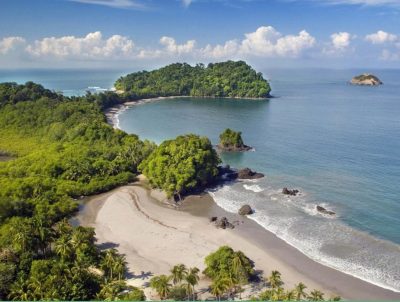It’s Always Pura Vida in Costa Rica
Costa Rica’s diverse and varied climate makes it easy for travelers to embark on a fantasy escape all year-round. Whether you’re a nature buff, thrill seeker or culture enthusiast, Costa Rica’s biodiverse terrain and magical wonders are waiting to be explored 365 days of the year. Classified as a tropical country because of its proximity to the equator, Costa Rica has no real winter, and it always feels like the sun is shining for a full twelve hours each day. There’s no excuse for leaving unused vacation days behind when Costa Rica is open 24/7.

Manuel Antonio National Park, located on Costa Rica’s Pacific Coast, is characterized by dense vegetation spilling onto the beaches’ clean white sand. With annual temperatures ranging in the 70’s, the beaches are a pleasant stop year round. (PRNewsfoto/Costa Rica Tourism Board)
Every day is a holiday in Central Valley. Travelers interested in enjoying cultural and natural attractions find it easy to experience both in the Central Valley region—home to the capital city of San Jose. Nestled between highlands, Central Valley buzzes with constant activity. Attractions like national parks and museums are open yearlong and a flurry of events provide visitors with many options to pack an itinerary. Also found here are large coffee plantations, sugar mills and dairy farms, where visitors can participate in agritourism.
All seasons are in-season on the Caribbean Coast. In this region, travelers will find stunning beaches and picturesque parks, complemented by Costa Rica’s inviting culture. The region features a unique blend of natural wonders and Afro-Caribbean traditions. A wide range of activities allow travelers to mix adventure with natural history, present-day culture, gastronomy and music. In Sarapiqui, for example, organic pineapple farm tours provide visitors with an entertaining firsthand look at the growing process and production history. While down the Sarapiqui River, adventure lovers can take exciting whitewater rafting trips.
Adventure waits for no one in the Northern Plains. This area is recognized as the home of Arenal Volcano National Park, which boasts 75 percent of Costa Rica’s bird population and presents endless adventure activities for visitors. Excursions range from hiking and waterfall rappelling, to canopying and exploring via a hanging bridge tour. Lake Arenal is also an ideal location for fishing, canoeing and kayaking. Visitors can take in the spectacular La Fortuna Waterfall as it plummets 200 feet out of the dense forest into a tranquil pool below and end the day with a soak in one of the natural hot springs.
The time to visit Guanacaste is now. This region combines breathtaking white, tan and black sand beaches with biodiverse parkland. Nature lovers will find two of the biggest wildlife centerpieces here: Rincon de la Vieja and Orosi. Complete with hot springs, waterfalls and a large variety of wildlife and birds, the Rincon de la Vieja National park is a must-see for its constant lush and verdant landscape. Orosi is home to the transitional cloud forest, where wildlife migrates between the Pacific coast and inland highlands.
It’s always Hump Day in the South Pacific Region. This is the perfect spot for almost year-round humpback whale sightings. Due to the seasons being reversed in North and South America, humpback whale migration to Costa Rica is nearly constant. At any given time you’ll see either Northern or Southern hemisphere pods making their way towards the warmer Tico waters. California and North Atlantic groups travel from December-April. Antarctic pods make the trek from July-November. There’s no greater instance of nature in its most beautiful manifestation.
While it’s warm all year-round on the coasts, it can be cool at night in the mountains. Elevation levels have the biggest impact on temperature. Yet, the average annual temperature is always around 70 to 81 degrees Fahrenheit (21 to 27 degrees Celsius). The main reason for the range in climate lies in the fact that Costa Rica has an ocean and a sea close to each other: the Pacific Ocean and Caribbean Sea. From mountain ranges and rain forests, to active volcanoes and breathtaking beaches, Costa Rica provides visitors with unlimited experiences at any given time.
For more information on Costa Rica, visit www.visitcostarica.com






